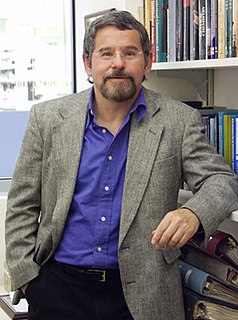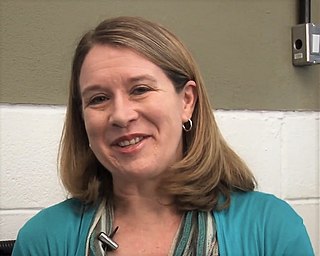
In the broadest definition, a sensor is a device, module, machine, or subsystem whose purpose is to detect events or changes in its environment and send the information to other electronics, frequently a computer processor. A sensor is always used with other electronics.
A biosensor is an analytical device, used for the detection of a chemical substance, that combines a biological component with a physicochemical detector. The sensitive biological element, e.g. tissue, microorganisms, organelles, cell receptors, enzymes, antibodies, nucleic acids, etc., is a biologically derived material or biomimetic component that interacts with, binds with, or recognizes the analyte under study. The biologically sensitive elements can also be created by biological engineering. The transducer or the detector element, which transforms one signal into another one, works in a physicochemical way: optical, piezoelectric, electrochemical, electrochemiluminescence etc., resulting from the interaction of the analyte with the biological element, to easily measure and quantify. The biosensor reader device connects with the associated electronics or signal processors that are primarily responsible for the display of the results in a user-friendly way. This sometimes accounts for the most expensive part of the sensor device, however it is possible to generate a user friendly display that includes transducer and sensitive element. The readers are usually custom-designed and manufactured to suit the different working principles of biosensors.

The Royal Society of Chemistry (RSC) is a learned society in the United Kingdom with the goal of "advancing the chemical sciences". It was formed in 1980 from the amalgamation of the Chemical Society, the Royal Institute of Chemistry, the Faraday Society, and the Society for Analytical Chemistry with a new Royal Charter and the dual role of learned society and professional body. At its inception, the Society had a combined membership of 34,000 in the UK and a further 8,000 abroad. The headquarters of the Society are at Burlington House, Piccadilly, London. It also has offices in Thomas Graham House in Cambridge where RSC Publishing is based. The Society has offices in the United States at the University City Science Center, Philadelphia, in both Beijing and Shanghai, China and Bangalore, India.

Joseph Wang is an American researcher and inventor. He is Distinguished Professor, SAIC Endowed Chair, and former Chair of the Department of Nanoengineering at the University of California, San Diego specializing in nanomachines, biosensors, nanobioelectronics, wearable devices, and electrochemistry. He also serves as the Director of the Center for Wearable Sensors at the University of California San Diego Jacobs School of Engineering.
Dame Lynn Faith Gladden is the Shell Professor of Chemical Engineering at the University of Cambridge. She served as Pro-vice-chancellor for research from 2010 to 2016.

Professor Anthony Peter Francis Turner, FRSC, usually known as Tony Turner, is a British academic specialising in the fields of biosensors and bioelectronics.
Christopher Robin Lowe OBE FREng is Emeritus Professor of Biotechnology and Director of the Institute of Biotechnology at the University of Cambridge and a Fellow at Trinity College. He has carried out research in the area of biosensors, biopharmaceuticals, and enzyme, protein and microbial technology. His research has been recognized by over 20 major national and international awards.

A field-effect transistor-based biosensor, also known as a biosensor field-effect transistor, field-effect biosensor (FEB), or biosensor MOSFET, is a field-effect transistor that is gated by changes in the surface potential induced by the binding of molecules. When charged molecules, such as biomolecules, bind to the FET gate, which is usually a dielectric material, they can change the charge distribution of the underlying semiconductor material resulting in a change in conductance of the FET channel. A Bio-FET consists of two main compartments: one is the biological recognition element and the other is the field-effect transistor. The BioFET structure is largely based on the ion-sensitive field-effect transistor (ISFET), a type of metal-oxide-semiconductor field-effect transistor (MOSFET) where the metal gate is replaced by an ion-sensitive membrane, electrolyte solution and reference electrode.
Liz Moran is a analytical chemist, and she specialises in food analysis and law. She is a public analyst, a Fellow of the Royal Society of Chemistry and serves on an RSC board. She is Deputy Head of Scientific Services at Public Analyst Scientific Services Limited, which is part of the multinational Eurofins Life Sciences Group. She was President of the Association of Public Analysts. between 2012 and 2015. In 2014, she was chosen as one of the 100 leading scientists by the Science Council. She was also chosen by the Royal Society of Chemistry as one of their 175 Faces of Chemistry.

Omowunmi "Wunmi" A. Sadik is a Nigerian professor, chemist, and inventor working at Binghamton University. She has developed microelectrode biosensors for detection of drugs and explosives and is working on the development of technologies for recycling metal ions from waste, for use in environmental and industrial applications. In 2012, Sadik co-founded the non-profit Sustainable Nanotechnology Organization.
Mary Corner, was a pharmacist, a worker in the British Cotton Industry and British Leather Manufacturers, Head of the Micro-analytical Section of the Chemical Research Laboratory, Vice-Chairman of the Microchemistry group and a founding member of the Microchemical Club.
Mary Andross (1893-1968) was a Scottish food chemist. She was one of the leading pioneers of dietetics.

Robert Mark Wightman is an electrochemist and professor of chemistry at the University of North Carolina at Chapel Hill. He is best known for his work in the areas of ultramicroelectrodes, electrochemistry, and neurochemistry. One of Wightman's most notable achievements is the development of the ultramicroelectrode and microelectrode voltammetry. At the same time as Wightman's innovations, the microelectrode was developed independently by Martin Fleischmann at the University of Southampton. In 2011, Wightman had the 192nd highest h-index, 74, of any living chemist. As of 2018, Wightman was an author of over 390 papers and had an h-index of 103.
Frances S. Ligler is a biochemist and bioengineer who was a 2017 inductee of the National Inventors Hall of Fame. Ligler's research dramatically improved the effectiveness of biosensors while at the same time reducing their size and increasing automation. Her work on biosensors made it easier to detect toxins and pathogens in food, water, or when airborne.

Christy Lynn Haynes is a chemist at the University of Minnesota. She works at the interface of analytical, biological, and nanomaterials chemistry.

Jacqueline Manina Cole is the Head of the Molecular Engineering group in the Cavendish Laboratory at the University of Cambridge. Her research considers the design of functional materials for optoelectronic applications.
Karen Jane Faulds is a Scottish academic and Professor of Analytical Chemistry at the University of Strathclyde. She develops surface-enhanced Raman spectroscopy (SERS) for bioanalysis, and has won several awards for her research, including the Coblentz Society Craver Award.
Ester H. Segal is an Israeli nanotechnology researcher and professor in the Department of Biotechnology and Food Engineering at the Technion - Israel Institute of Technology, where she heads the Laboratory for Multifunctional Nanomaterials. She is also affiliated with the Russell Berrie Nanotechnology Institute at the Technion - Israel Institute of Technology. Segal is best known for her research of porous silicon nanomaterials, as well as nanocomposite materials for active packaging technologies to extend the shelf life of food. In 2019, Lady Globes named her one of Israel's top 50 most influential women. Segal is part of the Editorial Advisory Board for the journal ACS Sensors, international advisory board for the Porous Semiconductors Science and Technology biannual conference, and organizing committee member for Israel Society for Biotechnology and Engineering.
Janice Leigh Limson is a South African Professor of Biotechnology, former Chairperson the School of Biotechnology at Rhodes University and the SARChI Chair in Biotechnology Innovation & Engagement at Rhodes University. She is founder and editor-in-chief of the magazine Science in Africa, the first popular online science magazine for Africa. Her research focuses on topics ranging from the development of nanotechnology biosensors for cancer diagnostics, drug delivery, detection of pathogens in food to the design of fuel cell technology.
Antje Baeumner is a German chemist who is Professor and Director of the Institute of Analytical Chemistry, Chemo- and Biosensors at the University of Regensburg in Germany. Her research considers biosensors and lab-on-a-chip devices for the detection of pathogenic organisms.








